Zoom
Trash

Charles III 'The Young Pretender' Henry. Jacobitism. Representation of The Jacobite 1745 flag.
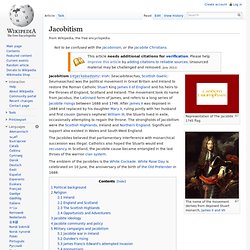
Jacobitism (/dʒeɪˈkɒbaɪtɪsm/; Irish: Seacaibíteachas, Scottish Gaelic: Seumasachas) was the political movement in Great Britain and Ireland to restore the Roman Catholic Stuart King James II of England and his heirs to the thrones of England, Scotland and Ireland. The movement took its name from Jacobus, the Latinised form of James, and refers to a long series of Jacobite risings between 1688 and 1746. After James II was deposed in 1688 and replaced by his daughter Mary II, ruling jointly with her husband and first cousin (James's nephew) William III, the Stuarts lived in exile, occasionally attempting to regain the throne.
The Jacobite Kings and Their Heirs. The biographies presented here show in some detail how the succession to the thrones of England, Scotland, France, and Ireland has passed from the House of Stuart through the Houses of Savoy and Habsburg to the House of Wittelsbach, where it remains to this day.
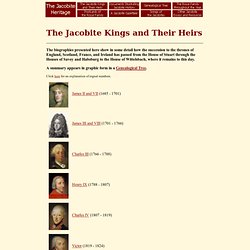
A summary appears in graphic form in a Genealogical Tree. Click here for an explanation of regnal numbers. James II and VII (1685 - 1701) James III and VIII (1701 - 1766) Charles III (1766 - 1788) Henry IX (1788 - 1807) Charles IV (1807 - 1819) Bonnie Prince Charlie and the Jacobites, Scotland - UK History. The Jacobite Challenge. Around Scotland - Jacobites.
Who are the Jacobites? "Jacobite" was the name given to the party, which after the revolution of 1688 in Britain, in which King James II and his family fled to Europe and settled in Rome, continued to support the Stuart dynasty, as representing the Divine Right to rule.
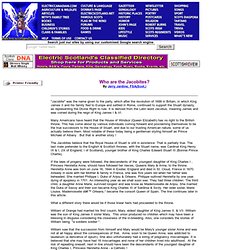
It is derived from the Latin word Jacobus, meaning James and was coined during the reign of King James I & VI. Many Americans have heard that the House of Windsor (Queen Elizabeth) has no right to the British throne. This has come about by various individuals coming forward and proclaiming themselves to be the true successors to the House of Stuart, and due to our trusting American nature, some of us actually believe them. Most notable of these today being a gentleman styling himself as Prince Michael of Albany . But that is another story ! The Jacobite Magazine. The Jacobite Magazine "The Jacobite" is the official Journal of The 1745 Association and is issued to members three times a year.
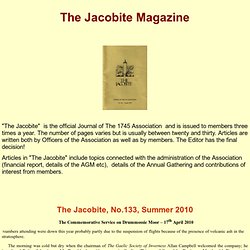
Could the Jacobites Have Won? Jeremy Black marks the bicentenary of the '45 Rebellion by assessing how close Bonnie Prince Charlie came to making his father James III of England.
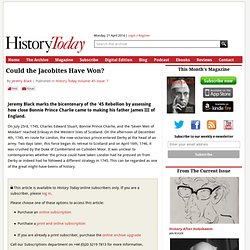
On July 25rd, 1745, Charles Edward Stuart, Bonnie Prince Charlie, and the 'Seven Men of Moidart' reached Eriksay in the Western Isles of Scotland. On the afternoon of December 4th, 1745, en route for London, the now victorious prince entered Derby at the head of an army. Two days later, this force began its retreat to Scotland and on April 16th, 1746, it was crushed by the Duke of Cumberland on Culloden Moor.
It was unclear to contemporaries whether the prince could have taken London had he pressed on from Derby or indeed had he followed a different strategy in 1745. Scottish History - The Jacobites. The Jacobites, and 'Bonnie Prince Charlie' in particular, tend to be seen in a romantic light, the reality of the disaster they brought down on Scotland and their supporters glossed over.
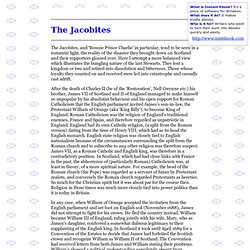
Here I attempt a more balanced view which illustrates the bungling nature of the last Stewarts. They lost a kingdom or two and retired into dissolution and bitterness. Those whose loyalty they counted on and received were led into catastrophe and casually cast adrift. Jacobites and the Jacobite Rising. F.J.
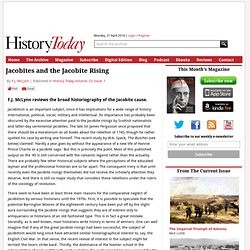
McLynn reviews the broad historiography of the Jacobite cause. Jacobitism is an important subject, since it has implications for a wide range of history: international, political, social, military and intellectual. Its importance has probably been obscured by the excessive attention paid to the Jacobite risings by Scottish nationalists and latter-day sentimental Jacobites.
The late Sir James Fergusson once proposed that there should be a moratorium on all books about the rebellion of 1745, though he rather spoiled his case by writing one himself. The recent study by W.A. There seem to have been at least three main reasons for the comparative neglect of Jacobitism by serious historians until the 1970s. The Jacobite Rebellion. A Jacobite was a supporter of the exiled royal house of the Stuart.
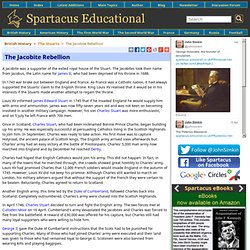
The Jacobites took their name from Jacobus, the Latin name for James II, who had been deprived of his throne in 1688. In 1743 war broke out between England and France. As France was a Catholic nation, it had always supported the Stuarts' claim to the English throne. King Louis XV realised that it would be in his interests if the Stuarts made another attempt to regain the throne. Louis XV informed James Edward Stuart in 1745 that if he invaded England he would supply him with arms and ammunition. Once in Scotland, Charles Stuart, who had been nicknamed Bonnie Prince Charlie, began building up his army.
Charles had hoped that English Catholics would join his army. Another English army, this time led by the Duke of Cumberland, followed Charles back into Scotland. In April 1746, Charles Stuart decided to turn and fight the English army. The West Highland Museum. The word Jacobite comes from Jacobus, the latin form of James, so literally meant a supporter of the line of James.
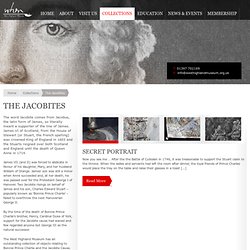
James VI of Scotland, from the House of Stewart (or Stuart, the French spelling) was crowned King of England in 1603 and the Stuarts reigned over both Scotland and England until the death of Queen Anne in 1714. James VII (and II) was forced to abdicate in favour of his daughter, Mary, and her husband William of Orange. James’ son was still a minor when Anne succeeded and, at her death, he was passed over for the Protestant George I of Hanover. Two Jacobite risings on behalf of James and his son, Charles Edward Stuart – popularly known as ‘Bonnie Prince Charlie’ – failed to overthrow the next Hanoverian George II. The Jacobite Heritage. The Jacobites and the Young Pretender. Jacobite support was strongest in the Highlands, although there were both Lowland and English Jacobites.
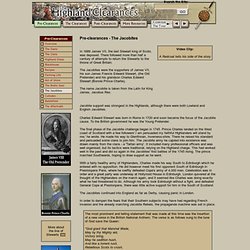
Charles Edward Stewart was born in Rome in 1720 and soon became the focus of the Jacobite cause. To the British government he was the Young Pretender. The final phase of the Jacobite challenge began in 1745. Prince Charles landed on the West coast of Scotland with a few followers'.I am persuaded my faithful Highlanders will stand by me,' he wrote. He made his way to Glenfinnan, Inverness-shire. With a fairly healthy army of Highlanders, Charles made his way South to Edinburgh which he entered with no opposition. The Jacobites continued into England as far as Derby, causing panic in London. Jacobites - Union of Crowns to Union of Parliaments - Scotlands History. In 1660, after the death of Oliver Cromwell, the Royalists took control and King Charles II was restored to the throne of England. Charles II ruled as first the Great Plague ravaged London and then, in 1666, the Great Fire of London burned the old city to ashes.
Ten years later, in 1676, the brother of Charles II - James, Duke of York - became a Roman Catholic. The Jacobites. Feb 6 1685 Charles II of England died and was succeeded by his brother, James II, a Roman Catholic. Charles II became a Roman Catholic on his deathbed. Apr 23 1685 James II is crowned King of England and Scotland (James VII of Scotland) in Westminster Abbey. June 10 1688 James Francis Stuart born. In honour of the "Old Pretender", this is known as "White Rose Day" in Jacobite circles. November 5 1688 William of Orange landed in South-West England. Jacobite Judas - ScotWars.
Ask most Scots about what happened A after the 1745 Jacobite Rebellion and they will tell you about Bonnie Prince Charlie's narrow escapes hiding in the heather and the romance of Flora MacDonald helping him. Many will talk of the savagery of `Butcher’ Cumberland after the battle of Culloden, of the people murdered, the glens laid waste, and the cottages in ruins. Some - but rather fewer - will also know about how the law was wielded against the- defeated to end Jacobitism once and for all °, and of how tartan and bagpipes were - banned: but not always mentioned is the cruel fate of those who had courageously borne arms for their Prince and who were later arrested. There was no Geneva Convention in those days to protect them and the result was a crude, makeshift but ruthless victors' justice. ' Aristocratic prisoners had show trials before their peers - but died just the same way as the foot soldiers.
‘Over the Sea to Skye’: The Jacobite Movement. Article by Marie Stirling. Edited by Ellie Veryard. Additional Research by Ellie Veryard. King James II and VII Britain had a new enemy after 1688. The Jacobite Diaspora 1688-1746: From Despair to Integration. About the Jacobites and Bonnie Prince Charlie. Jacobite Cause.
It was said when James had been born the doctor had sent out for a "warming-pan" It was suggested that this was some sort of code word that thew baby had been stillborn, and that a Within weeks of his birth, the child was sent to France for safety, and his father was fighting unsuccessfully to retain his crown. His Children were Mary II Anne James Francis Edward Stuart Grandchildren Charles Edward Stuart Henry Benedict Stuart. Welcome to the official website of the Jacobite Studies Trust. The Jacobite Intelligencer: Jottings of a Jacobite Antiquary.
In 1688, King James II of England and VII of Scotland was forced to flee his Kingdoms and take refuge in France. On 10th June of that year, his queen Mary of Modena had given birth to a son, James Francis Edward, Prince of Wales. The Jacobites: Romantic but Realistic. Sarah Fraser examines Bruce Lenman’s 1980 article on Jacobite exiles, part of a vigorous, influential rebuttal of a worn-out image. 'Jacobites' by John Pettie: romantic view of JacobitismThe Jacobites have always inspired writers, musicians and painters.
The Whig interpretation of history also favoured the colourful view of Jacobites descending like Icarus from brave hearts to bleeding hearts, drifting in a melancholic daze, rueing lost chances. Jacobitism. A.I. Investigating-jacobite-risings.pdf (application/pdf Object) Scottish History - 1745 Jacobite Rising (The Forty-Five) Map illustrating the 1745 Jacobite Uprising. The Jacobite Rebellion of 1755-46. The Jacobite uprising of 1715 - ScotWars. Scottish History: Jacobites. History / The Jacobites − Subjects − Online Collection − Collection. Fine Art Print - 'Disbanded' - A Scottish Highlander after the defeat at Culloden.
Jacobite Risings - Jacobites, Enlightenment and the Clearances - Scotlands History.